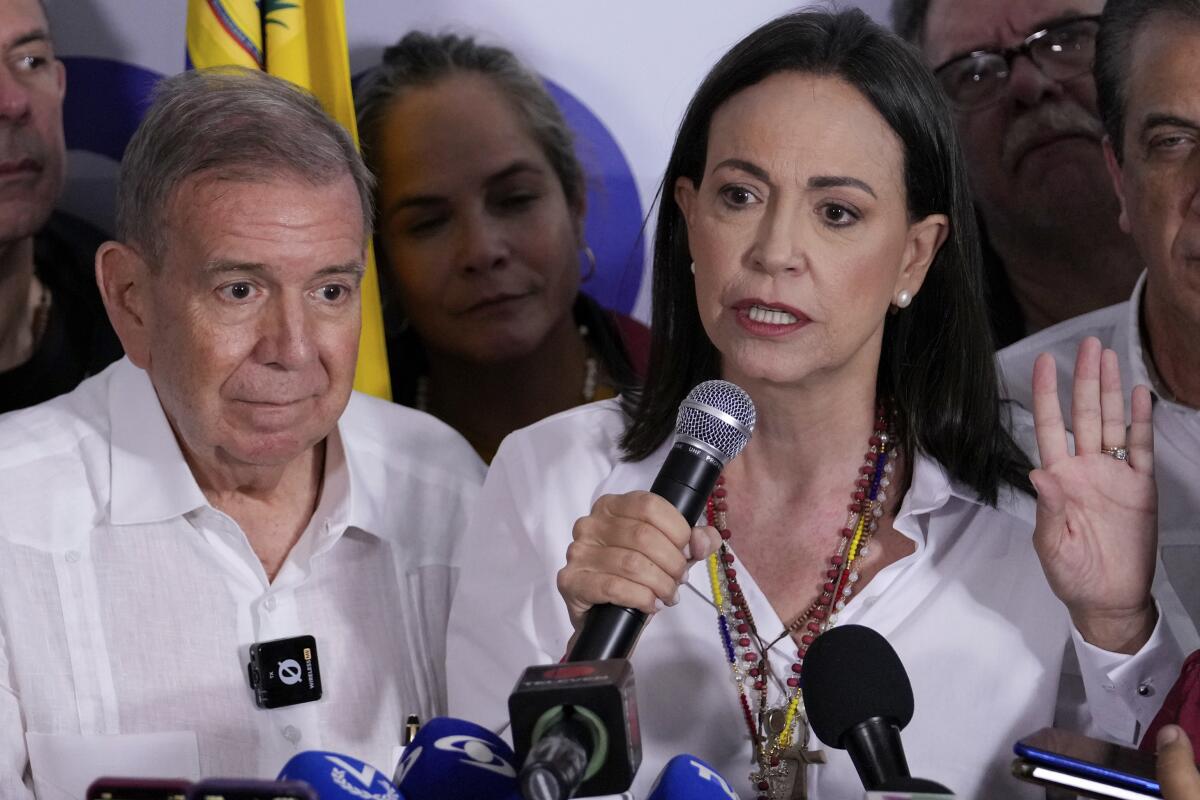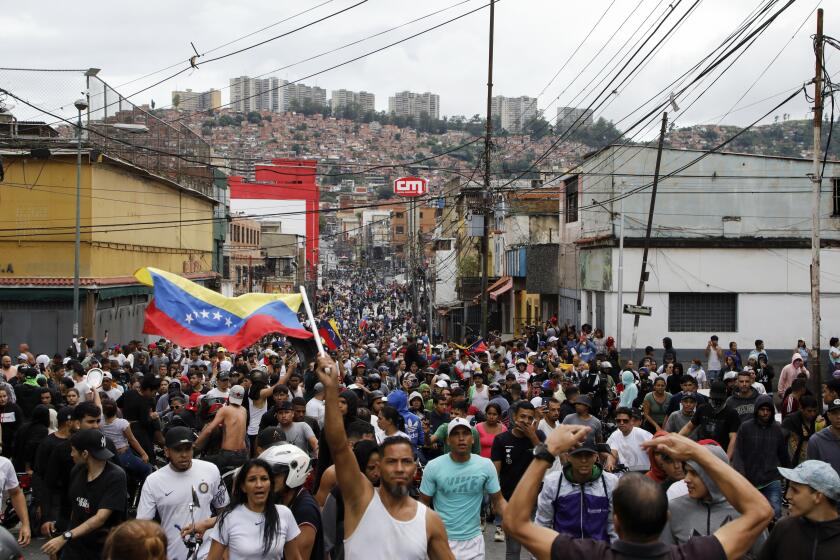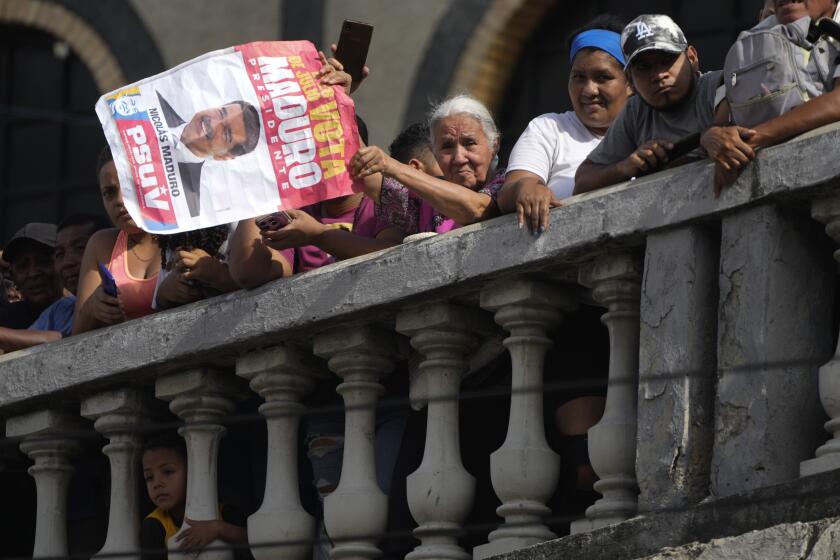Masked assailants ransack Venezuela opposition leader’s headquarters as postelection tensions mount

- Share via
CARACAS, Venezuela — Half a dozen masked assailants ransacked the headquarters of the Venezuelan opposition Friday in the latest escalation of violence against opponents of Nicolás Maduro following the country’s disputed presidential election.
Assailants broke down doors and hauled away valuable documents and equipment in the incident around 3 a.m., opposition leader Maria Corina Machado’s party said. Images published by the party on social media show several walls covered in black spray paint.
The vandalism follows threats by top officials, including Maduro, to arrest Machado, who has gone into hiding while still urging Venezuelans and the international community to challenge Sunday’s election results.
The Biden administration has thrown its support firmly behind the opposition, recognizing last-minute candidate Edmundo González Urrutia — representing Machado’s coalition — as the victor, discrediting the official results proclaiming Maduro the winner.
The U.S. announcement late Thursday followed calls from multiple governments, including close allies of Maduro, for Venezuela’s electoral authorities to release precinct-level vote counts, as it has done after previous elections.
The electoral body declared Maduro the winner Monday, but the main opposition coalition said hours later that it had collected copies of 80% of the country’s 30,000 voting tallies and that they show González prevailed by a more than 2-to-1 margin.
Opposition leaders said they obtained more than 84% of the vote tallies, which show opposition candidate Edmundo González won the election.
“Given the overwhelming evidence, it is clear to the United States and, most importantly, to the Venezuelan people that Edmundo González Urrutia won the most votes in Venezuela’s July 28 presidential election,” U.S. Secretary of State Antony J. Blinken said in a statement.
Maduro responded with a quick admonishment: “The United States needs to keep its nose out of Venezuela!”
González, whose whereabouts are also unknown, posted a message on X on Friday thanking the U.S. “for recognizing the will of the Venezuelan people reflected in our electoral victory and for supporting the process of restoring democratic norms in Venezuela.”
On Friday, Venezuelan electoral authorities gave an updated vote count, but not the precinct-level tallies demanded.
National Electoral Council President Elvis Amoroso said that with 96.9% of tally sheets counted, Maduro’s margin of victory was more than 8 percentage points over González: 52% to 43.2%. He attributed the delay in updating results to “massive attacks” on the “technological infrastructure.”
The U.S. announcement came amid a flurry of diplomatic efforts by the left-leaning governments of Brazil, Colombia and Mexico to convince Maduro to allow an impartial audit of the vote. On Thursday, the governments of the three countries issued a joint statement calling on Venezuela’s electoral authorities “to move forward expeditiously and publicly release” detailed voting data.
But it’s unclear what leverage the countries have over Maduro, who has shown little inkling to rethink his entrenched position.
On Friday, Vyacheslav Volodin, speaker of the lower house of Russian parliament, said that Russian election monitors had witnessed Maduro winning a legitimate victory. He accused the U.S. of fomenting tensions in the country.
“Washington is playing by its rules, which are aimed at maintaining its hegemony and expanding its influence,” Volodin said. “It doesn’t accept any other outcome but the victory of the candidate it backs.”
While no ally or anyone in the crucial armed forces has yet to break with Maduro over the contested election, he faces huge obstacles righting Venezuela’s economy without the legitimacy that can only come from a credible election result.
Venezuela sits atop the world’s largest proven crude oil reserves and once boasted Latin America’s most advanced economy, but it entered into free-fall marked by 130,000% hyperinflation and widespread shortages after Maduro became president in 2013. More than 7.7 million Venezuelans have left the country since 2014, the largest exodus in Latin America’s recent history.
Venezuela’s authoritarian president, Nicolás Maduro, trails in polling. Would the longtime U.S. adversary accept defeat in Sunday’s election?
U.S. oil sanctions have only deepened the misery, and the Biden administration — which had been easing those restrictions — is now likely to ramp them up again unless Maduro backs down and agrees to some sort of transition.
“He’s counting on being able to wait this out and people will get tired of demonstrating,” said Cynthia Arnson, a distinguished fellow at the Wilson Center, a Washington think tank. “The problem is the country is in a death spiral and there’s no chance the economy will be able to recover without the legitimacy that comes from a fair election.”
After the National Electoral Council declared Maduro the winner Monday, thousands of opposition supporters took to the streets. The government said it arrested hundreds of protesters, and Venezuela-based human rights organization Foro Penal said 11 people were killed. Dozens more were arrested the next day, including a former opposition candidate, Freddy Superlano.
Machado — who was barred from running for president — and González addressed a huge rally of their supporters in the capital, Caracas, on Tuesday, but they have not been seen in public since. Later that day, the president of the National Assembly, Jorge Rodríguez, called for their arrest, describing them as criminals and fascists.
On Wednesday, Maduro asked Venezuela’s highest court to conduct an audit of the election, but that request drew almost immediate criticism from foreign observers who said the court, which like most institutions is controlled by Maduro’s government, lacks the independence to perform a credible review.
In an op-ed published Thursday in the Wall Street Journal, Machado said she is “hiding, fearing for my life, my freedom, and that of my fellow countrymen.” She reasserted that the opposition has physical evidence that Maduro lost the election and urged the international community to intervene.
“We have voted Mr. Maduro out,” she wrote. “Now it is up to the international community to decide whether to tolerate a demonstrably illegitimate government.”
Machado later posted a video on social media calling on supporters to gather Saturday across the country.
Associated Press writers Cano and Castillo reported from Caracas; Goodman reported from Medellin, Colombia; Sá Pessoa from Sao Paulo. AP correspondent María Verza in Mexico City contributed to this report.
More to Read
Sign up for Essential California
The most important California stories and recommendations in your inbox every morning.
You may occasionally receive promotional content from the Los Angeles Times.












